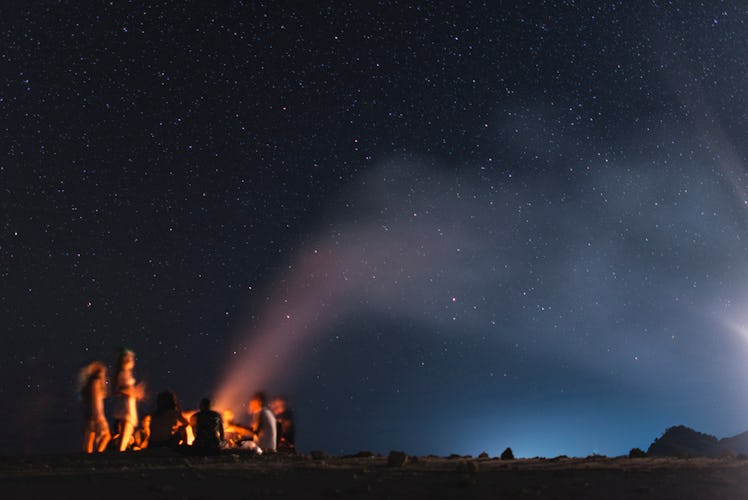
February Won't Have A Full Moon & Here's How It'll Affect You
We've heard all about the folklore that surrounds the full moon — people tend to be more scattered than usual, it's the best night to cast a spell, werewolves will transform into their wolflike forms, etc. So, then, you must be wondering all about what it means when there's no full moon in February, because thanks to the super blue blood moon, that's exactly what's about to happen.
Will the lunar calendar be irreparably messed up? Will February be the most boring month of all time? Where exactly does the full moon think it's going? This strange lunar prospect sparks a myriad of questions that need answering. For one thing, it's pretty rare! It happens on average, once every 19 years, according to the Farmers' Almanac. The last time it happened was in 1999 and before that, in 1980. After February 2018, the next "month without a full moon" is not slated to occur until 2037. Also, since February is consistently the shortest month of the year, a "month without a full moon" can only occur during February, pretty crazy, right?
Now, why is that? Well, we abide by the good old Gregorian calendar, the most widely and internationally recognized calendar in the world that includes all 12 months of the year. The moon couldn't care less about our silly, man-made calendar and instead, abides by her own.
A month in the lunar calendar lasts roughly 29.53 days, with the ending and beginning of each month shifting by 11 days each year. The entirety of a lunar year lasts around 354 days as opposed to our 365. This means that while both calendars usually line up nicely enough to grant each month a full moon, once in a while the moon will say "screw it" and do things her own way. So, in a sense, you could say the lunar calendar is always kind of messed up. On the other hand, you could also say it's perfectly imperfect!
What that missing full moon does instead is take a ride onto the next month, which causes a "blue moon" (when a second full moon occurs in the same month). We already have a blue moon coming up on Jan. 31 that's also *gasp* a blood moon and a supermoon. The full moon that's expected to occur in February will get moved over to March 1, causing a blue moon to occur on March 31.
Native American tribes have traditionally called the full moon in February the "Snow Moon" since in the United States, February experiences more snow fall than any other time of year. Some tribes have also nicknamed it the "Hunger Moon"; the Cherokee, in particular, called it the "Bone Moon" since, due to the cold of winter being at its thickest, food shortages were such a problem that people resorted to chewing on bones. With all these weighty names adorning the February full moon, it comes as a shocker that there is no official name for a situation where a full moon skips a month! "Didn't Show Up For Class Moon"? "Bye Felicia Moon"? "You Can't Sit With Us Moon"? Anyone?
Regardless, just because the full moon is deciding to snub us doesn't mean that February will be without its astronomical activity. It might be a little more chill than things usually are, but we've still got a partial solar eclipse to look forward to on Feb. 15 and it'll be in Aquarius! This will commence an explosion of conversations between unlikely people and a period where we'll be especially prolific when exchanging ideas. I mean, who needs the full moon anyway? (JK, see you in March.)
During a partial solar eclipse, the moon squeezes its way comfortably between the sun and the Earth without totally eclipsing the sun. This causes the moon's shadow to slice across the sun rather than obscure it completely. Just like 2017's solar eclipse on Aug. 21, make sure not to look at the sun directly and grab yourself a pair of the correct sunglasses.